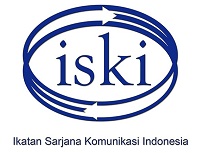Community shifts in Segunung Village due to information technology influence
Abstract
Background: The development of information technology has transformed rural communities from their traditional focus on local matters to being integrated into the global society. This shift significantly affects media consumption and production and consequently changes the way people interact with one another as they socialize in both real life and cyberspace. Purpose: This study aimed to find out the communication construction of rural communities living in Carangwulung Village, Wonosalam District, Jombang Regency. Methods: By using a phenomenological approach, the researchers revealed the experiences and meanings of individuals in this phenomenon. In-depth interview was the main data collection technique in this study. Results: The results of the study unveiled a transformative shift in the way rural communities interact and communicate, attributable to the pervasive influence of information technology. Historically, rural communities have been characterized by close-knit bonds, where face-to-face interactions in communal gatherings, festivals, and local meetings were the norm. These events often served as both social and informational hubs, fostering a sense of unity, shared identity, and mutual support. Conclusion: As technology permeates every aspect of life in Segunung traditional village, the shift towards virtual interactions is inevitable, impacting the collective nature of the community. Implications: The presence of the internet changes the communication construction of rural communities where life and community activities become easier by living in a world with real reality and part of cyber society.
Keywords
Full Text:
PDFReferences
Alsaawi, A. (2016). A Critical Review of Qualitative Interviews. SSRN Electronic Journal. https://doi.org/10.2139/ssrn.2819536
Arafa, S. (2016). Sustainable Community Development with Human Dimensions: The Basaisa Experience. In Ecological Education in Everyday Life. https://doi.org/10.3138/9781442674233-016
Badan Pusat Statistik. (2022). Statistik Telekomunikasi Indonesia 2021. In Bps.Go.Id.
Berge, Z. L. (2013). Barriers to communication in distance education. Turkish Online Journal of Distance Education, 14(1).
Berger, P., & Luckmann, T. (2016). The social construction of reality. In Social Theory Re-Wired: New Connections to Classical and Contemporary Perspectives: Second Edition. https://doi.org/10.4324/9781315775357
Chusnah, M. (2020). Keunggulan Durian Bido dalam Pengembangan Agrowisata Durian Wonosalam Jombang. Agrosaintifika : Jurnal Ilmu-Ilmu Pertanian, 2(2).
Creswell, J. W., & Creswell, J. D. (2018). Research design: qualitative, quantitative, and mixed methods approaches (Fifth). Sage.
Fatema, K., Nasreen, S., Parvez, M. S., & Rahaman, M. A. (2020). Impact of Using the Internet on Students: A Sociological Analysis at Bangabandhu Sheikh Mujibur Rahman Science and Technology University, Gopalganj, Bangladesh. Open Journal of Social Sciences, 08(12). https://doi.org/10.4236/jss.2020.812007
Gunawan, H., Suryadi, K., & Malihah, E. (2015). Analisis Perubahan Sosial Budaya Masyarakat Desa Cihideung sebagai Desa Wisata. SOSIETAS, 5(2). https://doi.org/10.17509/sosietas.v5i2.1524
Halik, A. (2017). Pragmatisme Komunikasi Masyarakat Pedesaan (Rekonstruksi Ruang Sosial Penggunaan Telepon Seluler di Pedesaan). Jurnal Dakwah Tabligh, 18(1), 46–55.
Isaacs, A. (2014). An overview of qualitative research methodology for public health researchers. International Journal of Medicine and Public Health, 4(4). https://doi.org/10.4103/2230-8598.144055
Karman. (2015). Construction Of Social Reality As Thought Movement (Theoretical Review On Social Construction of Reality Peter L. Berger). Jurnal Penelitian Dan Pengembangan Komunikasi Dan Informatika, 5(3).
Khan, S. N. (2014). Qualitative Research Method: Grounded Theory. International Journal of Business and Management, 9(11). https://doi.org/10.5539/ijbm.v9n11p224
Knoblauch, H., & Wilke, R. (2016). The Common Denominator: The Reception and Impact of Berger and Luckmann’s The Social Construction of Reality. Human Studies, 39(1). https://doi.org/10.1007/s10746-016-9387-3
Krishna, V. V. (2020). Open science and its enemies: Challenges for a sustainable science-society social contract. Journal of Open Innovation: Technology, Market, and Complexity, 6(3). https://doi.org/10.3390/JOITMC6030061
McFarland, L. A., & Ployhart, R. E. (2015). Social media: A contextual framework to guide research and practice. Journal of Applied Psychology, 100(6). https://doi.org/10.1037/a0039244
McLuhan, M. (2010). The Medium is the Message (1964). In Crime and Media: A Reader. https://doi.org/10.4324/9780367809195-4
Muhammad, N. (2017). Resistensi Masyarakat Urban Dan Masyarakat Tradisional Dalam Menyikapi Perubahan Sosial. Substantia, 19(2).
Ngafifi, M. (2014). Kemajuan teknologi dan pola hidup manusia dalam perspektif sosial budaya. Jurnal Pembangunan Pendidikan: Fondasi Dan Aplikasi, 2(1). https://doi.org/10.21831/jppfa.v2i1.2616
Rahmat, A. (2017). Interaksi Sosial dalam Dunia Maya ( Fenomenologi Cyber Tumming dan Abu Youtubers Makassar). Jurnal Ilmu Komunikasi.
Rahmatin, L. (2023). Analisis Potensi Budaya Lokal sebagai Atraksi Wisata Dusun Segunung. Jurnal Kajian Dan Terapan Pariwisata, 3(2), 30–40.
Ranney, M. L., Meisel, Z. F., Choo, E. K., Garro, A. C., Sasson, C., & Morrow Guthrie, K. (2015). Interview-based Qualitative Research in Emergency Care Part II: Data Collection, Analysis and Results Reporting. In Academic Emergency Medicine (Vol. 22, Issue 9). https://doi.org/10.1111/acem.12735
Rohayati. (2017). Budaya Komunikasi Masyarakat Maya (Cyber): Suatu Proses Interaksi Simbolik. Sosial Budaya, 14(2). https://doi.org/10.24014/sb.v14i2.4432
Sugiyono. (2017). Metode Penelitian Kuantitatif, Kualitatif, dan R&D. Alfabeta.
Townsend, L., Wallace, C., Smart, A., & Norman, T. (2016). Building Virtual Bridges: How Rural Micro-Enterprises Develop Social Capital in Online and Face-to-Face Settings. Sociologia Ruralis, 56(1). https://doi.org/10.1111/soru.12068
Wilbur, S. P. (2013). An archaeology of cyberspaces: Virtuality, community, identity. In Internet Culture. https://doi.org/10.4324/9780203948873-8
Yulianty, P. D., & Jufri, A. (2020). Perdebatan Empiris : Prinsip Metode Kualitatif dan Kuantitatif Untuk Penelitian Sosial Ekonomi. Value : Jurnal Manajemen Dan Akuntansi, 15(2). https://doi.org/10.32534/jv.v15i2.1291
DOI: https://doi.org/10.24198/jkk.v11i2.48762
Refbacks
- There are currently no refbacks.
Copyright (c) 2023 Merry Fridha Tri Palupi, Rahmat Edi Irawan, Dian Wardiana Sjuchro, Isni Nurfauziah

This work is licensed under a Creative Commons Attribution-NonCommercial-ShareAlike 4.0 International License.
Jurnal Kajian Komunikasi Indexed by:
Editorial Office of Jurnal Kajian Komunikasi:
Faculty of Communication Science, Universitas Padjadjaran
Jl. Raya Bandung-Sumedang Km. 21 Jatinangor, Sumedang 45363, Indonesia
WA: +6282316731181 (Chat Only)
Telephone: +62227796954
Faxmile: +62227794122
E-mail: jurnal.kajian.komunikasi@unpad.ac.id
Jurnal Kajian Komunikasi Supervised by:










